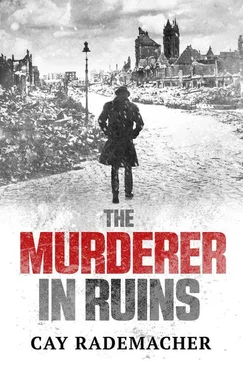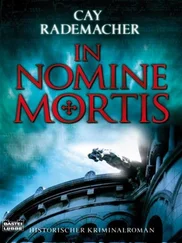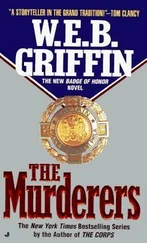Cay Rademacher - The Murderer in Ruins
Здесь есть возможность читать онлайн «Cay Rademacher - The Murderer in Ruins» весь текст электронной книги совершенно бесплатно (целиком полную версию без сокращений). В некоторых случаях можно слушать аудио, скачать через торрент в формате fb2 и присутствует краткое содержание. Год выпуска: 2015, ISBN: 2015, Издательство: Arcadia Books Limited, Жанр: Триллер, на английском языке. Описание произведения, (предисловие) а так же отзывы посетителей доступны на портале библиотеки ЛибКат.
- Название:The Murderer in Ruins
- Автор:
- Издательство:Arcadia Books Limited
- Жанр:
- Год:2015
- ISBN:9781910050750
- Рейтинг книги:5 / 5. Голосов: 1
-
Избранное:Добавить в избранное
- Отзывы:
-
Ваша оценка:
- 100
- 1
- 2
- 3
- 4
- 5
The Murderer in Ruins: краткое содержание, описание и аннотация
Предлагаем к чтению аннотацию, описание, краткое содержание или предисловие (зависит от того, что написал сам автор книги «The Murderer in Ruins»). Если вы не нашли необходимую информацию о книге — напишите в комментариях, мы постараемся отыскать её.
The Murderer in Ruins — читать онлайн бесплатно полную книгу (весь текст) целиком
Ниже представлен текст книги, разбитый по страницам. Система сохранения места последней прочитанной страницы, позволяет с удобством читать онлайн бесплатно книгу «The Murderer in Ruins», без необходимости каждый раз заново искать на чём Вы остановились. Поставьте закладку, и сможете в любой момент перейти на страницу, на которой закончили чтение.
Интервал:
Закладка:
‘After this war and the 12 years of that regime there are more than enough people running around Germany whose underdeveloped conscience hasn’t the slightest problem with one death more or less. And we would see most of them as ordinary honest citizens.’
‘Even so, it’s not every day here in Hamburg that a young woman gets garrotted, stripped and left lying in the rubble.’
The prosecutor nodded: ‘ Touche . So, what do you really think happened, Chief Inspector?’
‘I reckon it was somebody mentally deranged. Somebody who knew the victim or at least had been surreptitiously watching her. Somebody who planned the deed over weeks or even months, and chose the moment to strike.’
‘What evidence do you have?’
‘Apart from the brutal nature of the attack, none at all.’ Stave didn’t see the point in trying to make the prosecutor think he knew more than he did. ‘In our line of work we often have to deal with mentally unsound people. I’m no expert in this field. If people like that – as I’ve heard said – have a particular modus operandi, there’s none obvious here. But then it’s a bit too early for that.’
The two of them sat in silence for a while. There was no need to say what both Stave and Ehrlich were thinking: there would be more such murders.
‘So what do you intend to do now?’ the prosecutor finally asked, pouring them both more tea.
The chief inspector nodded in thanks and warmed his hands on the cup, inhaled the aroma, and smiled. Then he pulled out of his coat pocket a roll of paper that still smelled of fresh printer’s ink.
‘This is the first copy of a reward poster we intend to put up,’ he said, handing it over the table.
‘“A reward of one thousand Reichsmarks”,’ Ehrlich read out in a quiet voice. ‘“Robbery and murder. On Monday, 20 January 1947, an as yet unidentified woman was found dead in Baustrasse, Hamburg. Violent robbery suspected.” Well, you’re not exactly a poet, Chief Inspector.’ Ehrlich examined the photograph of the deceased and read the description.
‘One minute you tell me you don’t suspect it was violent robbery,’ he said. ‘And yet here I am reading it in black and white.’
‘I don’t want to get people worried,’ Stave said in justification. ‘And in any case, I don’t think suggesting it might be a mentally disturbed individual is exactly going to help.’
‘What do you mean?’
‘If we say we’re looking for a lunatic then hundreds of witnesses will turn up accusing their neighbours, colleagues or anybody who’s got up their noses. That will mean a waste of time and effort, and cause more problems than it solves.’
‘You may well be right.’
‘We’re going to put up these posters all over town, and wait until somebody who knows the victim turns up.’
‘And what do you intend to do in the meantime?’
‘I intend to go to the cemetery,’ Stave replied. ‘They’re burying the victim this afternoon in Ojendorf. I’ll stay in the background and see if any mourners turn up.’
Stave didn’t return directly to his office after the interview. Instead he wandered aimlessly around town. He needed to get his thoughts in order, and that was something he did best while walking. He went through every detail of the case again in his head: what did he know about the victim? Nothing. About the perpetrator? Even less. What else could he do but wait? Wait for a witness to turn up, or at least somebody who could identify the victim from the photograph on the poster. But what if nobody turned up? Maybe he had missed a trick? But if he had, what was it?
Stave felt under pressure, and he didn’t like that. Under pressure from Cuddel Breuer, and from Ehrlich. He preferred to work on his own. He liked to bring in experts only when necessary: photographers, forensics, pathologists. But what was he supposed to do with Maschke? Not to mention MacDonald. Neither of them were CID people; they were amateurs not professionals. On the other hand, maybe an outsider’s opinion might be useful: it was possible the Brit might notice something he had missed. He seemed bright enough, and he had influence.
Stave dragged himself away from his thoughts. He was back at Eppendorfer Baum, a long way from Karl-Muck-Platz. A snack bar had been set up in a half-ruined building. The upper stories had been hit by a bomb and the remainder of the building stood like a half-eviscerated corpse. Only the ground floor seemed undamaged and somebody had put up a board with the childishly scrawled words ‘Fresh meals’.
Stave walked into the brightly lit but sadly unheated room and sat down at a table. He did his best to ignore the throbbing in his left ankle. He cast a casual glance around. It was midday and there were a few workers, a few office people, a mother with two children, and sitting on his own in a corner a man with a ‘Russia face’ in an undyed Wehrmacht greatcoat, the empty left sleeve sewn up to the front of it.
Stave ordered the dish of the day, which cost one Reichsmark: a pickled herring with two thin slices of gherkin and a spoonful of some murky vegetables with no taste. He gobbled it down, only to feel hungrier than before. If only they had coffee. He sighed deeply, paid and left.
Back at the office MacDonald was waiting for him. Or at least that’s what he said. Stave had the impression that it was not so much the murder investigation that had brought the lieutenant to Karl-Muck-Platz as the chance for a chat with Erna Berg.
‘Anything new from the ranks of the British army?’ Stave asked.
MacDonald gave an apologetic shrug that for a moment made him look like a little boy. ‘Everybody stares wide-eyed when they see the photograph, but there’s no indication that anybody recognises her.’
‘Have you got your jeep here?’
The lieutenant nodded. ‘Are we going on a car chase? Like in the American movies? Should I get us Tommy guns?’
Reluctantly Stave found himself smiling: ‘We can hide the hardware in a black coffin. We’re going to the cemetery.’
The chief inspector was relieved that he didn’t have to travel by tram and on foot all the way out to the east of Hamburg. MacDonald drove him there in his boxlike, mud-coloured jeep, parking it right by the main entrance. When they set off the wind was blowing so hard the collapsible windscreen rattled back and forth and cold draughts blew through rips in the canvas top, while the suspension was so hard, every time they bounced over a pothole it was like a blow to the solar plexus. But Stave didn’t mind. He closed his eyes for a moment, massaging the thigh of his bad leg. He had cramp and was in pain.
‘An old war wound?’ MacDonald was driving carefully, keeping his eyes on the road, but he must have spotted him out of the corner of his eye.
Stave felt he’d been somehow caught out. ‘A ceiling beam fell on me; I didn’t get out of the way in time,’ he told him curtly.
The lieutenant just nodded.
‘How is it you speak such good German?’ Stave asked him, trying to steer the conversation away from himself, and because he couldn’t think of anything else to ask. He had to repeat it, louder, to make himself heard over the noise of the engine.
‘I learned it at university, Oriel College, Oxford. I was actually studying history but my special subject was Prussia. I did my master’s degree on Bismarck’s attitude towards Great Britain in the years prior to 1870. I even came to Berlin to study some documents.’
‘You did all of that before the outbreak of the war? How old are you then?’
MacDonald laughed. ‘I was a Christmas baby, born on 24 December 1920. I was in Berlin during my first year at university, aged just 18. That was the summer of 1939. I had intended to stay for a few months, but in August it was becoming ever more clear that war was likely, so I upped sticks and left. There are probably a few books of mine gathering dust in a rented room somewhere. Unless, of course, the rented room has been burnt to the ground.’
Читать дальшеИнтервал:
Закладка:
Похожие книги на «The Murderer in Ruins»
Представляем Вашему вниманию похожие книги на «The Murderer in Ruins» списком для выбора. Мы отобрали схожую по названию и смыслу литературу в надежде предоставить читателям больше вариантов отыскать новые, интересные, ещё непрочитанные произведения.
Обсуждение, отзывы о книге «The Murderer in Ruins» и просто собственные мнения читателей. Оставьте ваши комментарии, напишите, что Вы думаете о произведении, его смысле или главных героях. Укажите что конкретно понравилось, а что нет, и почему Вы так считаете.











